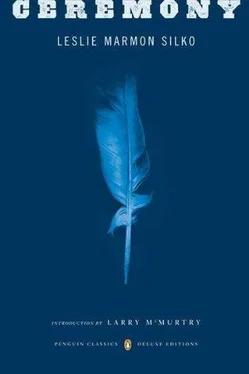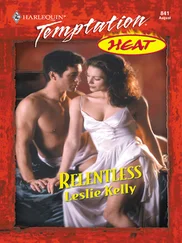At the end of the first week, she came into the room and pulled the sheets and blankets from all the beds, and he realized then she changed the beds as if Josiah and Rocky still slept there, tucking the dark wool blankets around the corners of the clean sheets, stuffing the pillows into starched white pillowcases she had ironed the day before. Finally he heard her step close to his bed and lift the lid on the slop jar to see if it needed to be emptied.
“How are you feeling?”
He knew she wanted him to get out of the bed while she changed the sheets. He sat up and swung his legs around to the floor. He got up unsteadily and moved toward the chair at the foot of the bed, but she took his arm and guided him to Rocky’s bed. He wanted to pull out of her reach and go to the chair, but he was swaying with nausea. She pushed him into the bed and brought the slop jar. He pulled his knees up to his belly and writhed in the bed, fighting back the gagging. He felt the old mattress then, where all the years of Rocky’s life had made contours and niches that Tayo’s bones did not fit: like plump satin-covered upholstery inside a coffin, molding itself around a corpse to hold it forever. He called for help, and he drew his legs and arms stiffly to his sides and arched his back away from the mattress. His heart was pounding louder than his calls for help; he could hear old Grandma answering him, but Auntie did not come. Finally she came in from the porch. The sleeves of her dress were rolled up, her hands were damp and smelled like bleach. She pulled him from the bed, her face tight with anger.
He pointed at the windows. “The light makes me vomit.”
She pulled down the shades, and he knew she was staring at him, almost as if she could see the outline of his lie in the dim light. But his advantage was the Army doctors who told her and Robert that the cause of battle fatigue was a mystery, even to them. He felt better in the dark because he could not see the beds, where the blankets followed smooth concave outlines; he could not see the photographs in the frames on the bureau. In the dark he could cry for all the dreams that Rocky had as he stared out of his graduation picture; he could cry for Josiah and the spotted cattle, all scattered now, all lost, sucked away in the dissolution that had taken everything from him. Old Grandma sat by her stove, comfortable with darkness too. He knew she listened to him cry; he knew she listened to the clang of the enamel lid of the slop jar as he removed it and leaned over to vomit.
In the beginning old Grandma and Robert stayed away from him, except to say “Good morning” or “Good night”; the sickness and his crying overwhelmed them. Auntie had taken charge of him. In low clear tones that Tayo could hear, she warned them to be careful to make no mention of Rocky or Josiah. Tayo could see what she was trying to do.
When he heard Robert come in from a trip to the ranch, he sat up on the bed and called him.
“The bay mare had her colt. A horse colt. Sorrel with a blaze. Sort of crooked down his face, like this.” Robert spoke slowly and softly, indicating the marking on the colt’s forehead by outlining it with a finger on his own face.
Tayo realized then that as long as Josiah and Rocky had been alive, he had never known Robert except as a quiet man in the house that belonged to old Grandma and Auntie. When Auntie and old Grandma and Josiah used to argue over how many lambs should be sold, or when Auntie and old Grandma scolded Josiah for the scandal of his Mexican girl friend, Robert sat quietly. He had cultivated this deafness for as many years as he had been married to Auntie. His face was calm; he was patient with them because he had nothing to say. The sheep, the horses, and the fields — everything belonged to them, including the good family name. Now Robert had all the things that Josiah had been responsible for. He looked tired.
“I helped my brother-in-law with our fields. But they don’t expect me to do very much now. They know I’m pretty busy over here.”
“When I get better, I can help you.”
Robert smiled and nodded. “That would be nice,” he said softly, “but don’t hurry. You take it easy. Get well.” He stood up. He was a short, slight man with a dark angular face. He put his hand on Tayo’s arm. “I’m glad you are home, Tayo,” he said. “I sure am glad.”
He woke up crying. He had dreamed Josiah had been hugging him close the way he had when Tayo was a child, and in the dream he smelled Josiah’s smell — horses, woodsmoke, and sweat — the smell he had forgotten until the dream; and he was overcome with all the love there was. He cried because he had to wake up to what was left: the dim room, empty beds, and a March dust storm rattling the tin on the roof. He lay there with the feeling that there was no place left for him; he would find no peace in that house where the silence and the emptiness echoed the loss. He wanted to go back to the hospital. Right away. He had to get back where he could merge with the walls and the ceiling, shimmering white, remote from everything. He sat up and pushed off the blankets; he was sweating. He looked at old Grandma sitting in her place beside the stove; he couldn’t tell if she was sleeping or if she was only listening to the wind with her eyes closed. His voice was shaking; he called her. He wanted to tell her they had to take him back to the hospital. He watched her get up slowly, with old bones that were stems of thin glass she shuffled across the linoleum in her cloth slippers, moving cautiously as if she did not trust memory to take her to his bed. She sat down on the edge of the bed and she reached out for him. She held his head in her lap and she cried with him, saying “A’moo’oh, a’moo’ohh” over and over again.
“I’ve been thinking,” she said, wiping her eyes on the edge of her apron, “all this time, while I was sitting in my chair. Those white doctors haven’t helped you at all. Maybe we had better send for someone else.”
When Auntie got back from the store, old Grandma told her, “That boy needs a medicine man. Otherwise, he will have to go away. Look at him.” Auntie was standing with a bag full of groceries in her arms. She set the bag down on the table and took off her coat and bandanna; she looked at Tayo. She had a way she looked when she saw trouble; she frowned, getting her answer ready for the old lady.
“Oh, I don’t know, Mama. You know how they are. You know what people will say if we ask for a medicine man to help him. Someone will say it’s not right. They’ll say, ‘Don’t do it. He’s not full blood anyway.’” She hung up her coat and draped the scarf on top of it.
“It will start all over again. All that gossip about Josiah and about Little Sister. Girls around here have babies by white men all the time now, and nobody says anything. Men run around with Mexicans and even worse, and nothing is ever said. But just let it happen with our family—” Old Grandma interrupted her the way she always did whenever Auntie got started on that subject.
“He’s my grandson. If I send for old Ku’oosh, he’ll come. Let them talk if they want to. Why do you care what they say? Let them talk. By planting time they’ll forget.” Old Grandma stood up straight when she said this and stared at Auntie with milky cataract eyes.
“You know what the Army doctor said: ‘No Indian medicine.’ Old Ku’oosh will bring his bag of weeds and dust. The doctor won’t like it.” But her tone of voice was one of temporary defeat, and she was already thinking ahead to some possible satisfaction later on, when something went wrong and it could be traced back to this decision. Like the night she tried to tell them not to keep the little boy for Sis any more; by then she was even running around with colored men, and she was always drunk. She came that night to leave the little boy with them. They could have refused then. They could have told her then not to come around any more. But they didn’t listen to her then either; later on though, they saw, and she used to say to them, “See, I tried to tell you.” But they didn’t care. Her brother, Josiah, and her mother. They didn’t care what the people were saying about their family, or that the village officers had a meeting one time and talked about running Sis off the reservation for good.
Читать дальше












